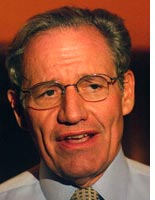
Bob Woodward
iven the administration's outrageous conduct in leaking Plame's name, and allowing for Woodward's special place in the pantheon of modern journalism, it is easy to feel betrayed both by his silence and by his seemingly unnecessary public pronouncements. But make no mistake about it: Patrick Fitzgerald is a tenacious prosecutor. He found Judith Miller despite the fact that she (unlike Matthew Cooper) hadn't gone public with what she'd been leaked; he found creative ways to pressure potential targets and witnesses into signing confidentiality waivers, and when that didn't work, he showed no compunction about jailing journalists, all in the pursuit of the information he wanted. Fitzgerald had all the power here. The failure was his—not Woodward's.


3 comments:
Excellently written... Very thought provoking... although I don't necessarily excuse Woodward.
Good piece. But while I agree that Woodward didn't have a legal obligation to reveal his info, the question remains whether he SHOULD have revealed his info. Many would think a person should reveal info that might establish the innocence of someone accused of a crime or that would help in the investigation of what might be a serious crime or misconduct. Do you have a view on this distinguishable issue?
Thanks folks--very nice of you to say.
I've gotten a lot of mail about this one, and many people have some of the same concerns. Obviously I wrote the piece because I felt strongly that (though I admit that it's not the central point) the relationship between prosecutor and citizen (journalist or otherwise) was getting trounced in the Woodward hoopla. As for his public statements I think they were at best bad taste and at worst disingenuous but I didn't go into it any more deeply because it wasn't the point I felt needed making. Sometimes, at least for me, making the ancillary point that's being lost in the larger discussion is just as important than weighing in on the more central one.
As for the interesting question you raise, I say this: Sure it is often nice when people come forward with important information. But we already err too far on the side of telling. Anything that makes it feel like an obligation, though, is really dangerous.
Thanks so much for your thoughts and for reading...
Post a Comment